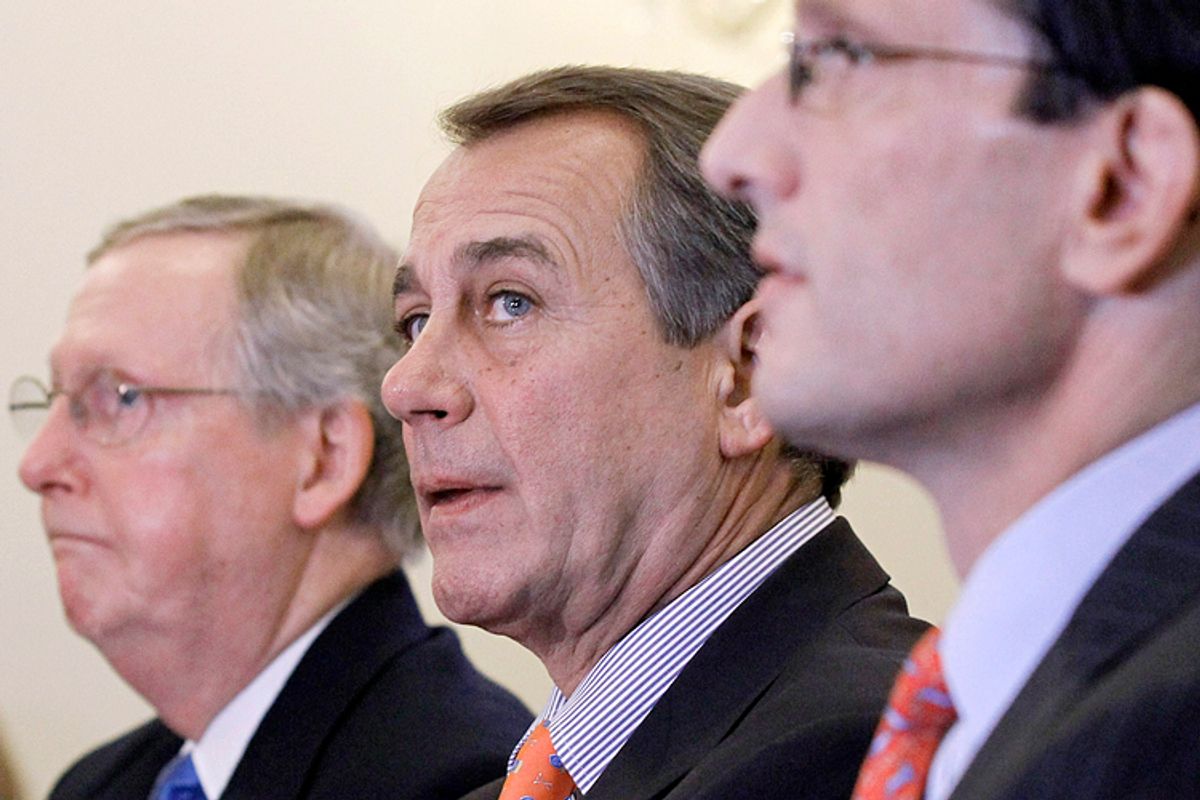On Wednesday, the bottom fell out of the GOP's Hail Mary "shut down the government over Obamacare" strategy.
Perhaps not coincidentally, it was also the day that the party's leaders tried to revise and soften the terms of the fight -- to make it about broader fiscal issues, which is what they wanted it to be about in the first place .
But until yesterday, the polling on the shutdown was mixed enough that Republicans could have probably justified dragging it out indefinitely, so long as it held steady. It didn't hold steady.
Credit: gallup.com
Since the shutdown began, and more intensely since initial polling data on the shutdown became available, horse-race junkies have been weighing in on whether it will endanger the GOP's adamantine House majority. The 2010 gerrymander fortified Republican control of the House against a 7 percentage point loss in the national popular vote. Could the shutdown swing the polling so dramatically?
Polling experts at first said, "Dream on." If House Democrats only won the national popular vote by 1.5 percent in 2012, it would take more than a GOP shutdown to quintuple that margin in a midterm, base turnout election.
On Tuesday, Princeton's Sam Wang offered a statistical counterpoint, and Greg Sargent, courtesy of the Democratic Congressional Campaign Committee, provided anecdotal evidence that the shutdown will help Democrats recruit competitive candidates in tough GOP-held districts.
I'll leave polling analysis to the statisticians and campaigning to the parties.
But I would argue that beyond the midterms, the shutdown will be unusually problematic for Republicans as a national party. Earlier this year, when the party reached a crossroads between becoming a more ethnically inclusive, moderate party, and doubling down on its whites-only strategy, it chose the latter. This shutdown fight, intentionally or otherwise stands to rupture the white-white coalition.
After President Obama's reelection, the Republican National Committee conducted a ritual autopsy to determine what went wrong. The result of that postmortem was the Growth and Opportunity Project. It offered a number of suggestions to party operatives, but the two most important were:
1). "The Republican Party needs to stop talking to itself. We have become expert in how to provide ideological reinforcement to like-minded people, but devastatingly we have lost the ability to be persuasive with, or welcoming to, those who do not agree with us on every issue."
2). "[A]mong the steps Republicans take in the Hispanic community and beyond, we must embrace and champion comprehensive immigration reform. If we do not, our Party’s appeal will continue to shrink to its core constituencies only."
Today these prescriptions lie in tatters. The GOP has instead reprised the "monochromatic insularity" blueprint that served it so well in 2012. It's a strategy that might pay off in a midterm. But to have the faintest hope of winning a national election, a party of white people for white people must truly serve the interests of white people.
For a while, Republicans were doing just that. They killed immigration reform. The Voting Rights Act remains gutted. House Republicans delinked the farm bill from the food stamp program in order to more easily hollow out federal nutrition assistance while lavishing farmers with huge, indefensible subsidies.
Their continued crusade against Obamacare was part of the same pattern. The law remains unpopular, but it's especially unpopular among white people. Its greatest bases of support are in minority communities. That made it an especially appealing target.
But the nature of this base-mobilizing strategy created an incentive for conservative Republicans to battle each other for the claim to title of America's greatest Obamacare warrior. And things got out of control.
On its own, shutting down the government drives a wedge right through the GOP's alabaster coalition -- between the activist base and the people who rely on the government to one degree or another, even if they don't particularly hold it in high regard. But it left them without an easy exit strategy. Abandon the extortion campaign, and the activists scream bloody murder. Leave the government shutdown and, well, see above.
Instead, Republican leaders want to phase out the fight by changing the terms and terrain. And their new targets are -- wait for it -- Medicare and Social Security. See this Op-Ed by Rep. Paul Ryan, R-Wis., in which he mentions Obamacare precisely zero times, and argues instead that Congress' central focus should be cutting much more popular, durable programs. He even names a couple of specific Medicare adjustments Democrats might support, but only in a plan that includes new tax revenues. Guess how many times the word "revenues" appears in the piece.
This is not the battle you want to pick if your electoral imperatives require you to pander to white voters. Maybe in the days ahead, once the government is reopened and the risk of immediate default has passed, Republicans will walk away from the past month's events and pretend they never happened. The Obamacare defunders chastened. The establishment just grateful to have the latest embarrassment behind them.
If that's the plan, they could spend the next year or three repairing the damage. But they've made it very hard to extract themselves from this cycle of brinkmanship. And if the only way for them to end it is to spearhead a campaign to swap sequestration with cuts to so-called entitlements, while Obamacare finds its sea legs, they'll lose the activists, the marginally attached, and everyone in between.




Shares